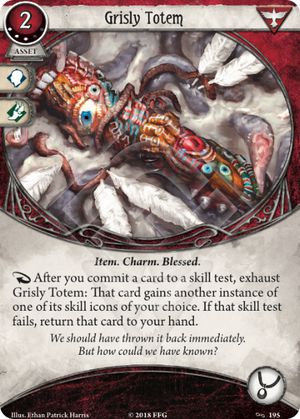There is a lingering question as to how this interacts with Take Heart. By rules as written, Take Heart's effect happens in step 7 of skill test resolution, same as the totem, and thus you can order the effects as you like in order to gain the benefit of Take Heart and take it back to your hand. Since there seems to be some uncertainty in the community as to this ruling, I'm going to consider this card both with and without this combo. Though my suspicion is that, since the rules as written support this combo, it is likely to stay.
So this is the long awaited (by me at least) upgrade to Grisly Totem. I think a lot of people were overly negative on the level 0 version of this card, which I felt was fairly powerful if not game changing. I think, on the contrary, most people are in agreement that both upgrades to it are strong additions to their respective factions.
The xp cost, the slot used, and to some extent the effect of this card make a comparison to Rabbit's Foot inevitable. Both are 3xp Accessories that go some way to insulate you against failed skill test. In the case of Grisly Totem this is by allowing you to "take back" a card after the result is revealed; in the case of Rabbit's Foot its by allowing you to draw a new card to replace the one's spent.
So where do they differ? Well, first of all Grisly Totem also helps you to pass the test, rather than just making failure less painful. In addition, Grisly Totem can be used in the aforementioned Take Heart combo as a way of generating cards and resources each turn. The Totem however costs an additional resource, while having for the most strictly worse icons. In addition, Grisly Totem only protects you from wasting cards on skill tests, it doesn't help you if you aren't committing cards to a test and it doesn't do anything to mitigate the wasted actions. Rabbit's Foot on the other hand can be used on any failed skill test, however important or unimportant it was. This allows it to be used on very high difficulty but low impact skill tests as a way to proactively dig for cards. Rabbit's Foot also has relevant combos, with cards such as Drawing Thin and Double or Nothing to allow it to act a pseudo-tutor effect.
I think that if you ignore Take Heart combo, Grisly Totem seems to stack up somewhat poorly against Rabbit's Foot in the general use case of softening the blow of failed skill tests. However, I think that Grisly Totem does have a niche where it substantially outperforms Rabbit's Foot. In my previous analysis, I was treating the value of a skill card returned to hand as roughly equivalent to digging for a card to draw. However, this may not always be the case. If you are for instance playing a Double or Nothing combo deck, returning your Double or Nothing after a is revealed is much more valuable than digging for a replacement card, for instance.
The other case where I think Grisly Totem outperforms Rabbit's Foot is when the additional skill icon is going to consistently matter. This means that you need to be playing a deck that plans on somewhat aggressively committing skill cards to tests in order to pass them. The obvious candidate here is Silas Marsh, which makes sense given that the second effect on this card is essentially a slightly different version of his investigator ability. However there is a case of diminishing returns here, since in order for this card to be maximally useful you would need to want that effect twice a round rather than just the once. Another investigator who often plays a lot of skill cards is "Ashcan" Pete, as he can use skill cards to boost his investigate actions with Duke, where other tools don't stack. It's also worth mentioning that due to the Blessed trait, Father Mateo can take this card. I'm not particularly convinced that this card does anything he wants, particularly since he has access to a lot of powerful accessories from his main class already, but its worth bearing in mind in future.
So all of this is assuming that the Take Heart combo doesn't work. However, as I said above, it currently does and likely will continue to. So in this case, it costs 2 upfront and then generates you 2 resources and 2 cards every turn from then on provided you fail a test. This is clearly extremely powerful. The caveat here is that unless you draw a treachery card with a test you're okay with failing then you are going to have to spend an action on doing so. Still, an action for 2 cards and 2 resources is well above the curve even for 3xp. For example, Jewel of Aureolus provides 1 card OR 2 resources once per turn on a 3xp accessory, for one more resource, and far less reliably. And that card is still pretty good! Of course this requires two cards, but Take Heart is already a staple and Grisly Totem is, as described above, at at least a pretty reasonable use of xp even without the combo.
So in conclusion, in a vacuum this card is a solid if not overly flashy choice for a few main class survivors, while also being part of yet another extremely powerful resource generating combo for the class.
